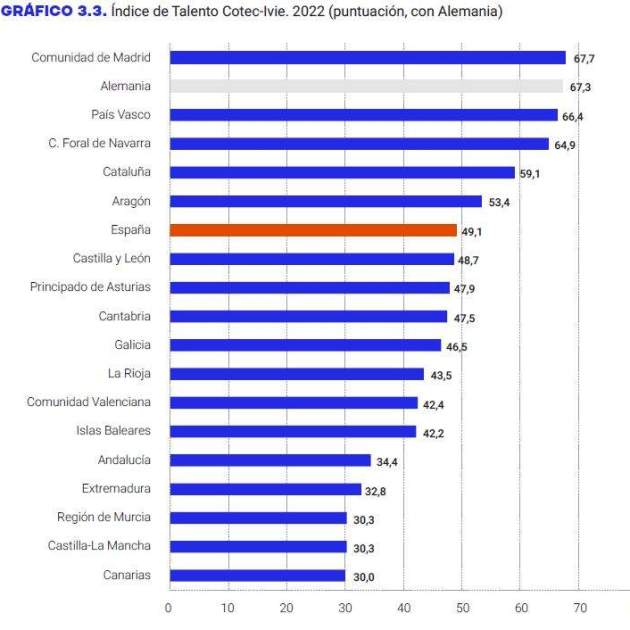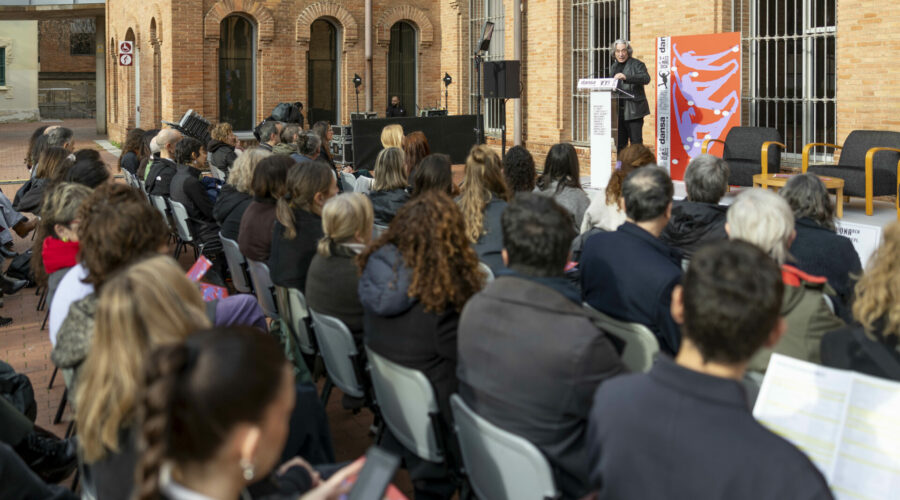Catalonia has been left off the podium in the Cotec Foundation’s Talent Map 2023. The Community of Madrid, the Basque Country and Navarre surpass it in almost all areas, except in technical capabilities. Compared to the capital region, Catalonia is eight points behind (59 vs. 67) according to the 2022 figures. This study measures numerous socio-employment, training and well-being indicators that determine a region’s ability to attract, develop and retain talent.
First edition of the Crush Barcelona festival: to recognize young literary talent
Evolution of Catalonia in the talent ranking
In the 2020 report, Catalonia already ranked fourth with 56.3 points, thus losing the podium it had held in 2019 with 57.7 points. In 2021 and 2022, no comparable reports were submitted, making this latest study crucial to understanding recent developments.
Migration data and talent
The Cotec study reveals that four out of every ten Spaniards who go abroad do so to occupy highly qualified positions, and more than half (52.7%) have higher education. In contrast, only 11.3% of migrants arriving in Spain occupy highly skilled positions. This mismatch in the attraction of qualified talent is a critical point that affects the competitiveness of the autonomous communities.
Woody Allen’s music and the festival of new talents come together at the Inauditus Festival
Comparison with Germany
Cotec also analyzes the migratory relations between Spain and Germany, one of the main poles of attraction of talent in Europe. When compared with Germany, the Community of Madrid outperforms the German average in some respects, although not the most competitive regions in Germany.

Cotec Talent Map
Talent enablers
The first pillar of Cotec’s ranking analyzes talent enablers, considering factors such as ICT infrastructure, technology use, vulnerability of companies and workers, teleworking and housing prices. In this aspect, the Community of Madrid leads with 77.2 points, surpassing the German average of 71.8 points. Behind are the Basque Country (70 points), Navarre (62.6) and Catalonia (62.1), which is still 10 points above the Spanish average of 51 points.
Espai Corberó opens its doors for free visits today, May 18th.
Talent attraction
The second pillar analyzes attractiveness, measuring market openness, foreign investment in high value-added sectors, the presence of international companies and students, the proportion of foreigners with higher education and the wage gap. Here, the Community of Madrid, Navarre and the Basque Country again lead the way, with Catalonia scoring 55.4 points, above the German average on this indicator.
Educational growth
The third pillar examines educational growth, looking at government momentum, PISA results and the performance of university systems. Despite having some of the best universities in Spain, Catalonia falls to ninth place in this aspect with 54.6 points, slightly above the Spanish average (52 points) and 17 points below the leader, Euskadi (71.3). Other communities such as the Community of Madrid, Cantabria, Aragon, Galicia, Navarre and Castile and Leon also outperform Catalonia in this pillar.
 Talent retention
Talent retention
The fourth pillar focuses on talent retention, analyzing factors such as social protection, health spending, environmental protection and commuting time. Catalonia obtained 59.1 points in this aspect, again behind the Community of Madrid (67.7 points), the Basque Country and Navarre. The Spanish average is 49 points, barely passing in talent retention.
Technical skills and vocations
Catalonia stands out in technical skills and vocations, measuring qualification, productivity and correspondence between training and occupation. With 80.8 points, it leads this aspect among the autonomous communities, ahead of Madrid (78.9) and the Balearic Islands (67.5). However, it is far from the German average of 94.4 points.
Knowledge and knowledge economy
The sixth pillar analyzes the population with higher education, the number of researchers, scientists and engineers, the percentage of senior managers, high value-added exports and spending on innovation. Catalonia obtained 62 points, being surpassed by Madrid (80 points), the Basque Country (77) and Navarre (70).
Overall performance and comparison
In the overall ranking, Catalonia appears with 59.1 points, almost 6 points below Navarre, which is third. Aragón follows with 53.4 points and the Spanish average is 49.1. The communities at the back of the pack in terms of Spanish talent, with less than 40 points, are Andalusia (34.4), Extremadura (32.8), the Region of Murcia and Castile-La Mancha (30.3 each) and the Canary Islands (30).
Next Generation R&D Funds
One factor that can improve talent attraction and retention is investment in R&D and the technology sector. The Cotec Foundation’s NextGen Monitor report highlights that 37.7% of the Next Generation funds already disbursed have been dedicated to research, development and digitalization: 14,536 million out of a total of 45,727 million euros. The Community of Madrid received the largest amount (2,857 million euros, 38.1% of the total), followed by Catalonia with 1,086 million (14.5%) and Andalusia with 627 million (8.4%).
This disparity is largely due to the greater presence of the headquarters of large companies and public bodies in Madrid, although the region has one million fewer inhabitants than Catalonia and two million fewer than Andalusia.
In conclusion, the Cotec Foundation report reveals the need for a clear and forceful strategy for Catalonia to regain its position on the podium of talent in Spain, enhancing its strengths and addressing its areas for improvement.


 Talent retention
Talent retention
